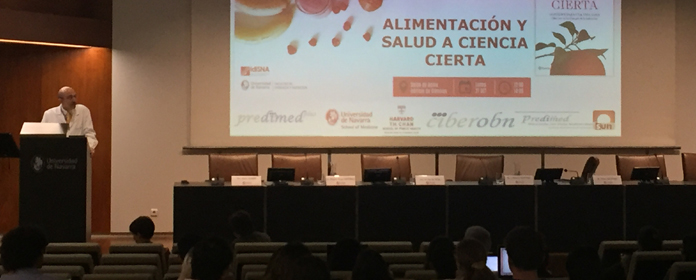Improving lifestyles for healthy wellbeing
On the occasion of World Food Day, the School of Pharmacy and Nutrition organized a roundtable with different experts to address issues such as nutrition, aging and physical activity.

"Only 7% of variability is explained by genes, so everything else we can do to benefit our health is more important". This is the argument used by Dr. Mikel Izquierdo, Full Professor of the department of Health Sciences of the Public University of Navarra (UPNA), during the roundtable "Lifestyles and healthy wellbeing". The event, organized by the School of Pharmacy and Nutrition at purpose on World Food Day, was also attended by Dr. Miguel Angel Martinez, Full Professor of Preventive Medicine and Public Health, and Dr. Alicia Huarte, specialist in Phoniatrics and Audiology of the Clínica Universidad de Navarra.
"It has been proven that we can reach a maximum life expectancy of around 120 years. However, the problem appears in the disease-free years, because a large part of those years gained thanks to scientific progress and quality of life are associated with disease, disability and dependence," explained Izquierdo. For this reason, the specialist in the prescription of physical exercise for the improvement of health and quality of life, bet on physical activity as the basis for "healthy aging" and thus reduce cardiovascular risks. He added that physical inactivity is manager of 3 million deaths worldwide and up to 37 clearly defined diseases. "Therefore, it can be concluded that much expense health is explained by the physical inactivity of the population."
Against this reality, he pointed out that research published in international journals has shown that "the strength of arms and legs has a similar distribution to that of traditional indicators (blood pressure, glucose...) measured by health systems", which places physical activity as a basis for reducing diseases and the risk of mortality.
The benefits of a correct dietFor his part, Miguel Ángel Martínez-González, Full Professor of Preventive Medicine and Public Health at the University of Navarra, stressed the importance of proper nutrition. "We are facing an unprecedented obesity pandemic. Every nine seconds a person dies from diabetes and it is a disease that one out of every eleven people in the world suffer from". To tackle this status Martínez alluded to the need to focus not so much on the risk factors that trigger cardiovascular pathologies, but rather on the determinants of these factors, "where a quality dietary patron saint plays an important role".
The expert emphasized per diem expenses, physical activity and avoiding smoking as the basis for improving lifestyle. "We have a food patron saint -the Mediterranean per diem expenses - that can be applied and that works. In fact, in Spain we are leading trials underway worldwide in food to change the dietary patterns of thousands of people for the benefit of their health."
"Over the last three years, life expectancy in the U.S. has been reduced consecutively, and the projections for overweight and obesity in the future are discouraging," he said. "Is there a Health System that can support them? That is why we must dedicate our efforts to prevention."
The social impact of good healthThe experts agreed that preventive work not only brings physical benefits to the population, but also extends to a broader context. Dr. Alicia Huarte detailed the advantages of healthy aging from her field of study, hearing loss. Thus, she analyzed the social and emotional impact that early action has on health, which limits the person much less and allows them to maintain their quality of life. In addition, he highlighted the economic aspect of the impact on the prevention of pathologies suffered by the elderly, which reduces health costs while reducing cardiovascular risk.




